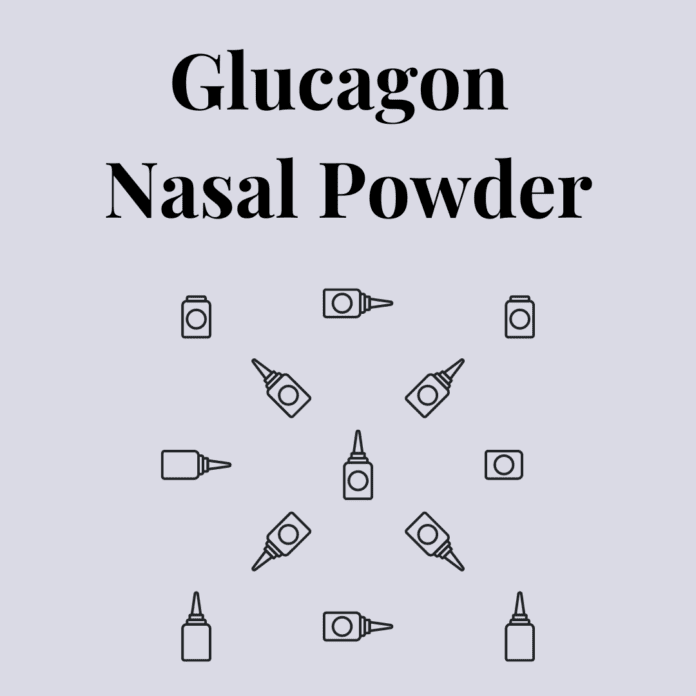Uses
Glucagon nasal powder is used along with emergency medical treatment to treat very low blood sugar in adults and children 4 years of age and older who have diabetes. Glucagon nasal powder is in a class of medications called glycogenolytic agents. It works by causing the liver to release stored sugar into the blood.
Side Effects Of Glucagon Nasal Powder
Glucagon nasal powder may cause side effects. Tell your doctor if any of these symptoms are severe or do not go away:
- nausea
- vomiting
- change in the ways things taste or smell
- headache
- sore or irritated nose or throat
- itchy nose, throat, eyes, or ears
- runny or stuffed nose
- watery or red eyes
- sneezing
- fast heartbeat
Some side effects can be serious. If you experience any of these symptoms stop using glucagon nasal powder and call your doctor immediately or get emergency medical treatment:
- rash, hives, swelling of face, eyes, lips, or throat, difficulty breathing or swallowing
- Glucagon nasal powder may cause other side effects. Call your doctor if you have any unusual problems while using this medication.
Warnings & Precautions
Before using glucagon nasal powder:
- tell your doctor and pharmacist if you are allergic to glucagon, any other medications, or any of the ingredients in glucagon nasal powder. Ask your pharmacist for a list of the ingredients.
- tell your doctor and pharmacist what prescription and nonprescription medications, vitamins, nutritional supplements, and herbal products you are taking or plan to take. Be sure to mention any of the following: beta-blockers such as acebutolol, atenolol (in Tenoretic), bisoprolol (in Ziac), metoprolol (Kapspargo, Lopressor, Toprol, in Dutoprol), nadolol (Corgard, in Corzide), nebivolol (Bystolic, in Byvalson), propranolol (Inderal LA, Innopran XL), sotalol (Betapace, Sorine, Sotylize), and timolol; indomethacin (Tivorbex); and warfarin (Coumadin, Jantoven). Your doctor may need to change the doses of your medications or monitor you carefully for side effects.
- tell your doctor if you have pheochromocytoma (tumor in the adrenal gland) or insulinoma (tumor in the pancreas). Your doctor will probably tell you not to use glucagon nasal powder.
- tell your doctor if you have poor nutrition, ongoing episodes of low blood sugar levels, or problems with your adrenal glands.
- tell your doctor if you are pregnant, plan to become pregnant, or are breastfeeding.
Dosage Of Glucagon Nasal Powder
Glucagon nasal powder comes as a powder in a device to spray into the nose. It does not need to be inhaled. It is usually given as needed to treat very low blood sugar. It is usually given as one dose, but if you don’t respond after 15 minutes another dose from a new device may be given. Each glucagon nasal powder device contains a single dose and should be used only once. The nasal powder can be used even if you have a cold.
You may be unable to treat yourself if you are experiencing very low blood sugar. You should make sure that your family members, caregivers, or the people who spend time with you know where you keep glucagon nasal powder, how to use it, and how to tell if you are experiencing very low blood sugar.
To use the glucagon nasal powder follow these steps:
- Hold the glucagon nasal powder device with your thumb on the bottom of the plunger and your first and middle fingers on either side of the nozzle.
- Gently insert the nozzle tip into one nostril until your fingers on either side of the nozzle are against the bottom of your nose.
- Push the plunger firmly all the way in until the green line on the bottom of the plunger can no longer be seen.
- Throw away the used device. Each device contains only one dose and cannot be reused.
- After using the nasal powder your family member or caregiver should call for emergency help right away. If you are unconscious, your family member or caregiver should turn you to lie on your side. Once you are able to swallow safely you should eat a fast-acting sugar such as juice as soon as possible. Then you should eat a snack such as crackers with cheese or peanut butter. After you have recovered call your doctor and let him know that you needed to use glucagon nasal powder.
Ask your pharmacist or doctor for a copy of the manufacturer’s information for the patient.
Other
Keep all appointments with your doctor.
Once you have used your glucagon nasal powder replace it right away so you will have the medication on hand for the next time you need it.
It is important for you to keep a written list of all of the prescription and nonprescription (over-the-counter) medicines you are taking, as well as any products such as vitamins, minerals, or other dietary supplements. You should bring this list with you each time you visit a doctor or if you are admitted to a hospital. It is also important information to carry with you in case of emergencies.
Source
All information has been provided courtesy of MedLinePlus from the National Library of Medicine and from the FDA.



